Disaster preparedness / In Times of Disaster, Hearing Women’s Voices and Meeting Women’s Needs
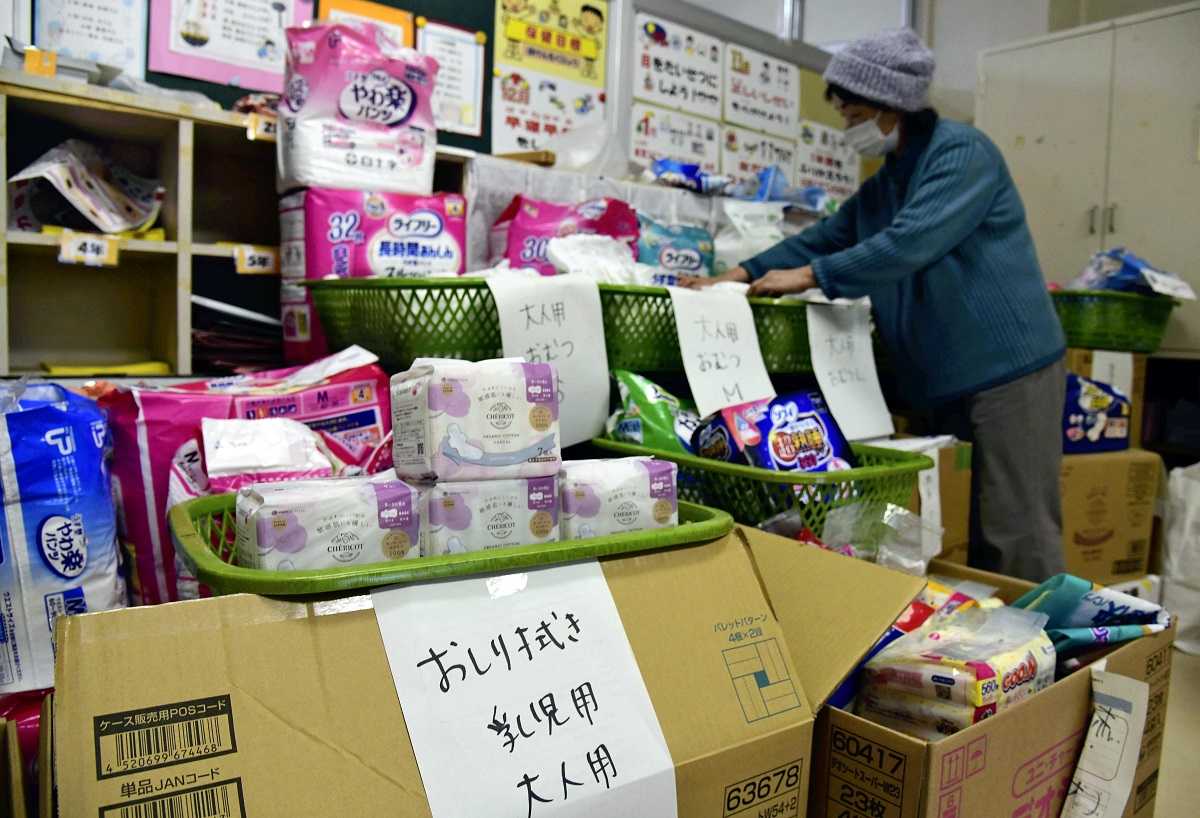
A woman sorts out relief supplies at an evacuation center set up in Suzu, Ishikawa Prefecture, in January after the Noto Peninsula Earthquake.
11:00 JST, October 28, 2024
Hearing women’s voices and meeting women’s needs in times of disaster
Taking women’s perspectives into account has become increasingly important in operating evacuation centers during times of disaster. As men are often unaware of many of the issues that they face, women themselves must be involved in running these services. In this way, they can help to meet various needs and create an environment so that not only women, but also babies, children and senior citizens can live in peace.
▽▽▽
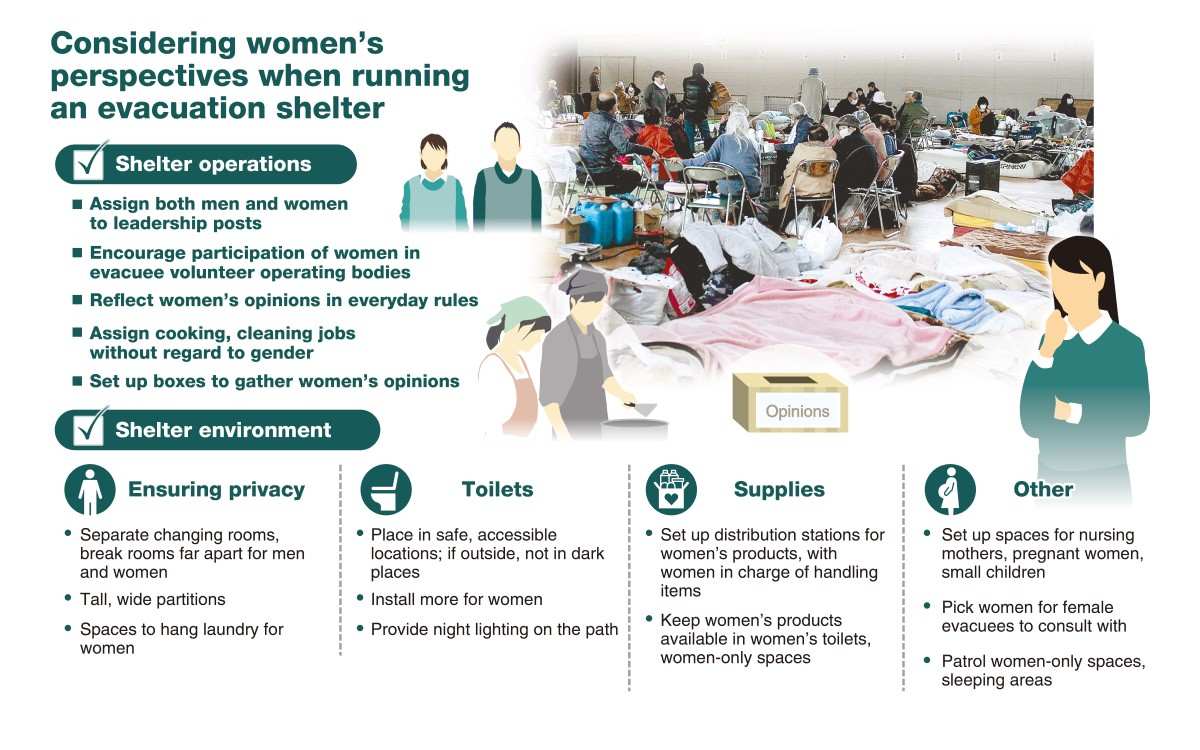
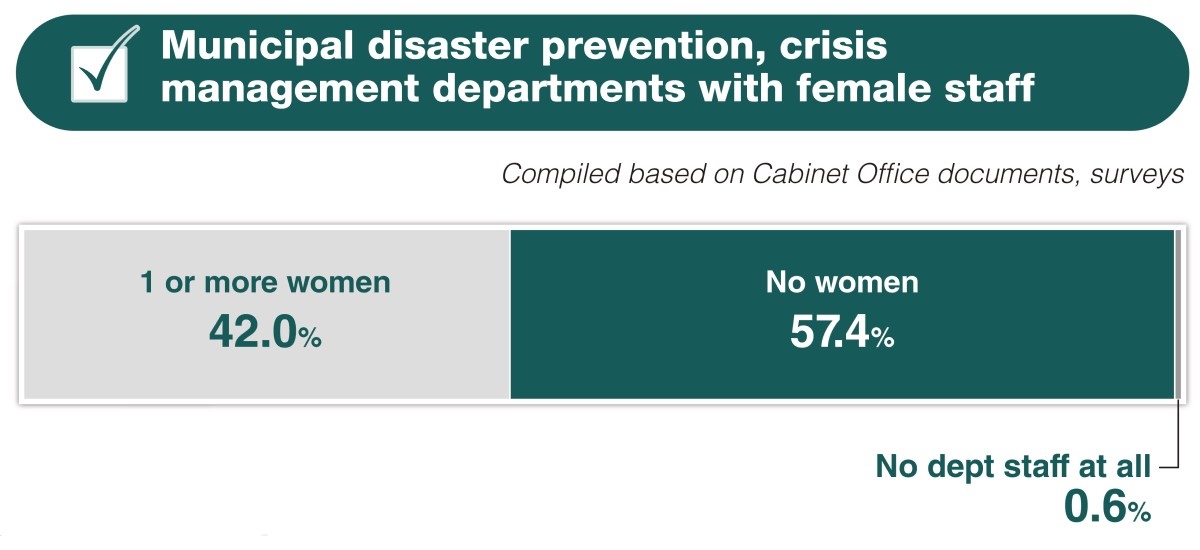
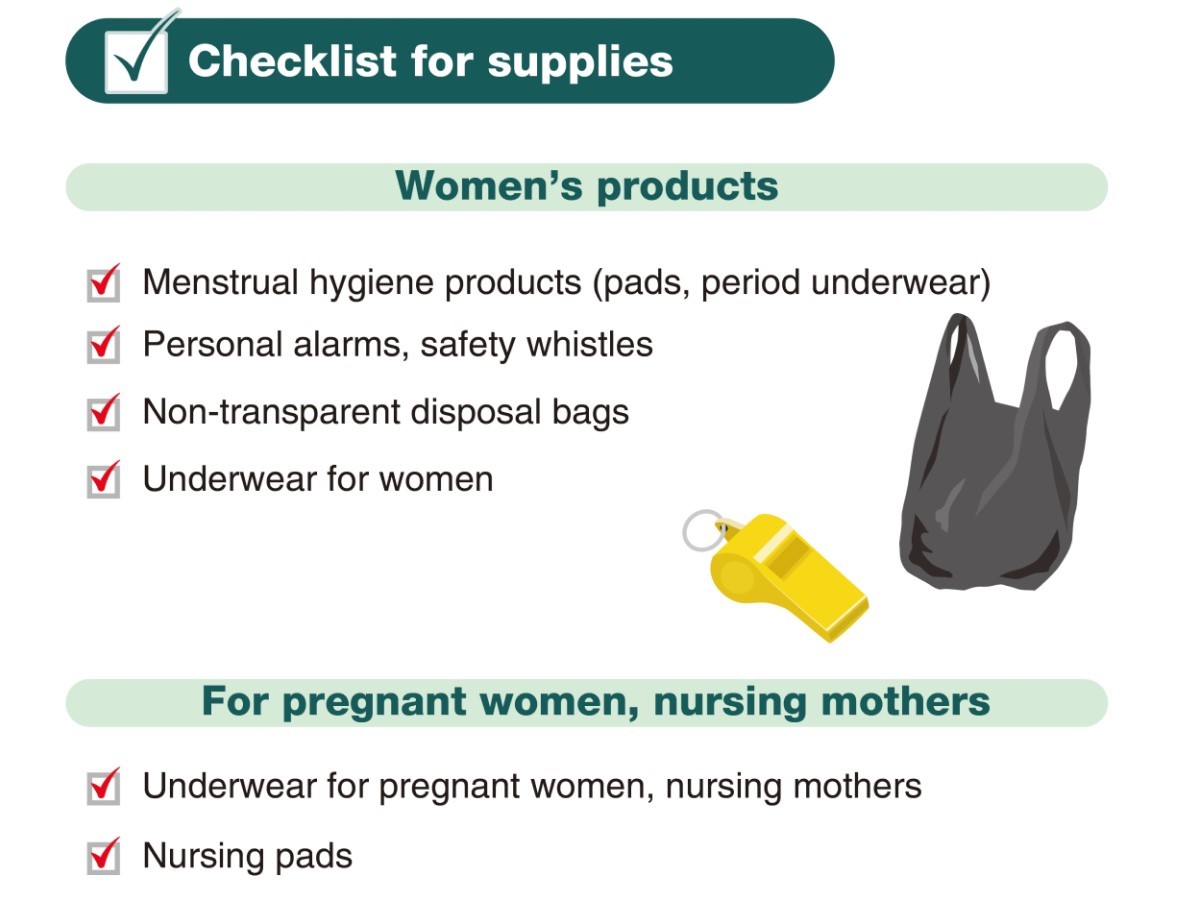
▽▽▽
‘It must be difficult for women to speak up’

Women tend to become exhausted from operating evacuation centers because they are often assigned to such roles as preparing meals. There have been many cases of insufficient consideration being shown for women, such as times when men have been put in charge of distributing women’s products, or when no space has been provided for women to change clothes. This has also been an issue in the aftermath of the Jan. 1 Noto Peninsula Earthquake.
In March and April, the Hokuriku Mirai Foundation, a public interest incorporated foundation based in Ishikawa Prefecture, worked with a women’s group in Noto in the prefecture to conduct a survey, which found that the needs of women and diverse groups of people in the affected areas were not understood.
“Since evacuation centers are often run mainly by men, I believe it must be difficult for women to speak up,” said Sekiko Osanai, representative director of Gender Equality Community Mirai Net, a general incorporated association that provides support for disaster-stricken areas. “There have been many evacuation centers where women were tasked with preparing meals.”
In 2020, the Cabinet Office compiled guidelines for disaster prevention and reconstruction that advised local governments to give more consideration to the different needs of women and men and consider women’s perspectives when responding to disasters.
Responding to the opinions of women, who tend to be responsible for child-rearing and nursing care during times of disaster, will also mean that the needs of children, the elderly and people with disabilities are taken into account.
However, a survey conducted by the Cabinet Office at the end of 2023 found that 57.4% of disaster prevention and crisis management departments in municipalities across the nation had no female staff.
“It is important [for such departments] to have female staff involved in decision-making processes and to create an environment where they can express their opinions,” said Osanai.
Both men and women should be in charge

It is important for evacuees to help each other and take the lead in running their own evacuation centers, rather than leaving it up to the government.
The Cabinet Office’s guidelines list appointing both men and women to shelter management positions, such as leaders and deputy leaders, and encouraging the participation of women in evacuee volunteer operating bodies as key policies for running an evacuation center.
“Ideally, evacuees themselves should participate in operating their evacuation centers,” said Ai Urano, executive director of Rescue Stock Yard, an authorized nonprofit organization that provides disaster relief. “The key is to regard the shelter as an extension of their home life.”
Make a list of tasks to be done, such as preparing meals, cleaning toilets, tidying public spaces and taking out the trash. Assigning these roles without regard to gender can help spread the workload evenly and lead to proactive management of the shelter.
“Many of these tasks are actually the same as what we do in our everyday lives. If you see the shelter as your home, you will become more aware of it,” said Urano.
There should also be a system to proactively listen to the concerns, voices and requests of evacuees. Ideally, women should be put in charge of listening to evacuees, consulting with them and setting up opinion boxes to make it easier to hear the voices of various people. Making checklists is also useful for keeping track of what items are in stock and which ones need to be requested.
Separate spaces for men and women
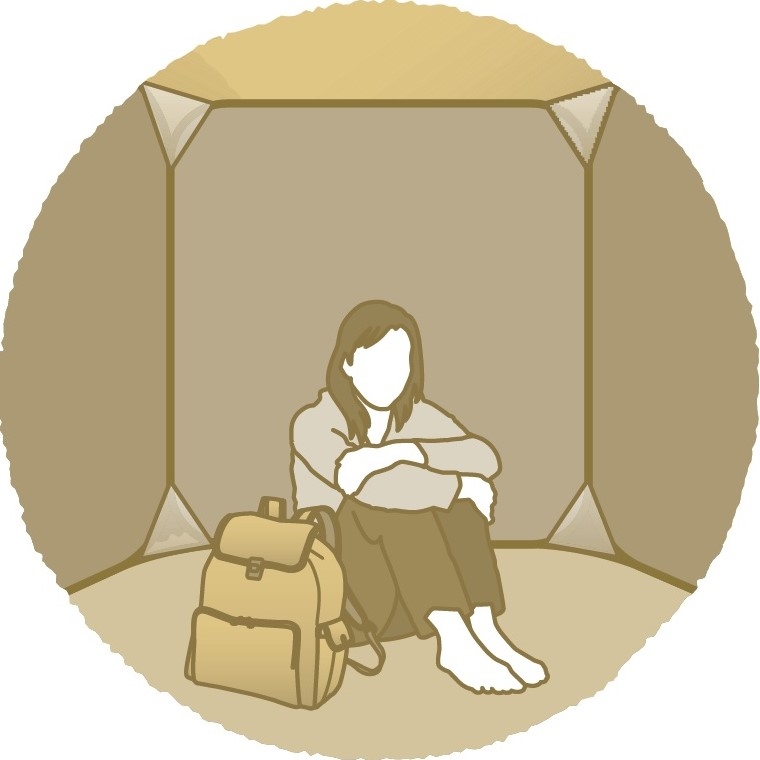
It is vital to create an environment that ensures evacuees have adequate privacy. Simply installing room partitions is not enough: Men and women should be provided separate restrooms, changing rooms, spaces to hang up laundry, break rooms and bathing facilities, among other sections.
Ideally, the male and female spaces should be located far apart from each other. Outdoor toilets should not be located in dark places, and women-only spaces such as changing rooms should be patrolled on a regular basis.
Handling women’s products also requires care.
“Many women would feel uncomfortable collecting items such as underwear and women’s products in a public place,” said Yoko Saito, a visiting professor at Kansai University of International Studies and an expert on gender issues in disasters. “Some may think these women are lucky to have access to such products in the event of a disaster, but that is a very inconsiderate way of looking at things.”
Women’s underwear should be placed in women-only spaces, while menstrual hygiene products should be placed in women’s toilets.
For families with infants and toddlers, ideally, there should be spaces for mothers to nurse and children to play. With the help of volunteers and support groups, a comfortable environment can be provided where they can feel at ease.
“Regardless of gender, it is important for everyone to want to get through things together, rather than having a structure in which men lead and women follow,” said Saito.
▽▽▽
3/11 survivor embraces life as high school baseball manager
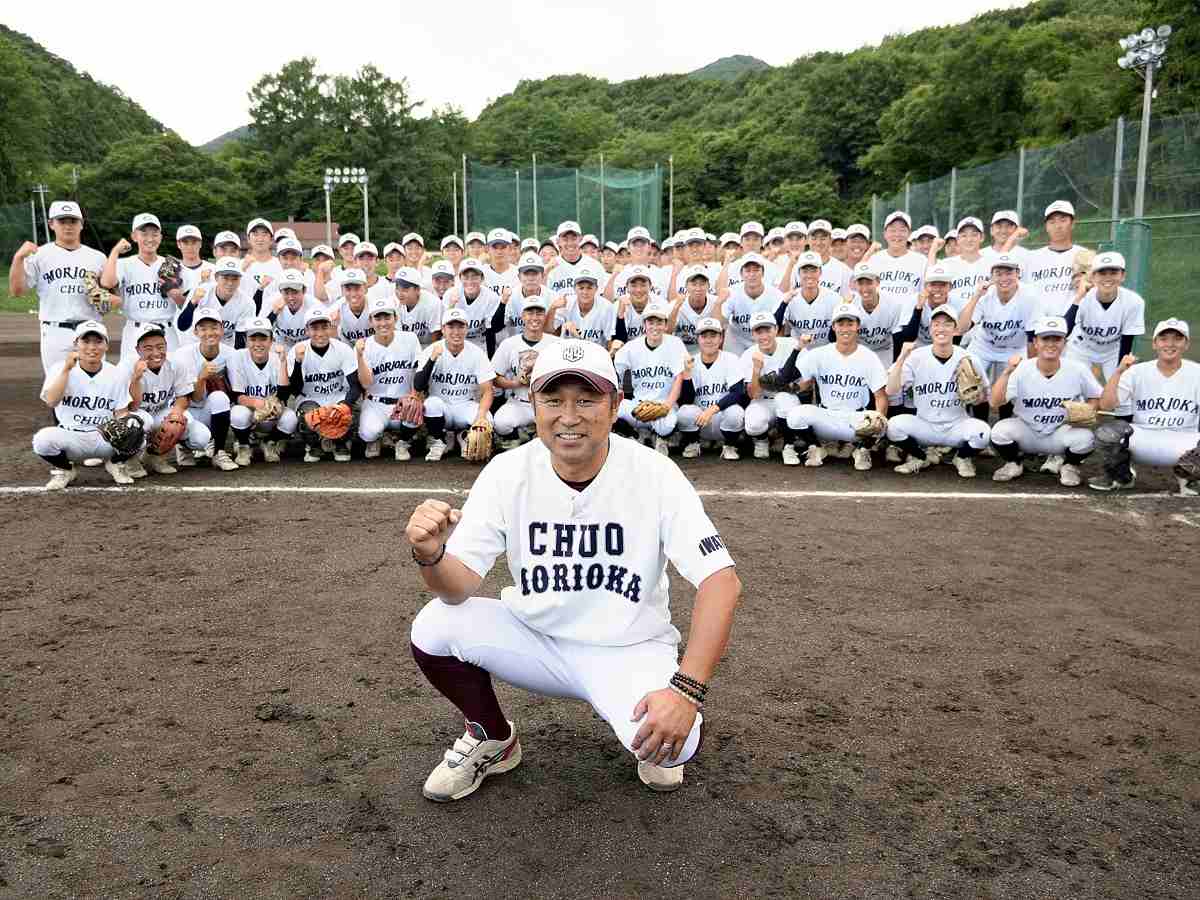
Masahiro Okutama, front, poses for a photo with members of Morioka Chuo High School’s baseball club in Takizawa, Iwate Prefecture, on July 4.
A survivor of the Great East Japan Earthquake has opened a new chapter in his life as the manager of a high school baseball club.
Masahiro Okutama, 50, was in Kesennuma, Miyagi Prefecture, when the quake struck in 2011, destroying both his home and the liquor store he ran.
He started coaching the Fuji University baseball club in Iwate Prefecture in 2012, after learning about the position through a friend, and then became the manager of the Morioka Chuo High School baseball club in 2019.
His stellar coaching skills are evidenced by eight of his former players going on to join the pros, including Shuta Tonosaki, 31, of the Seibu Lions.
“Your time on Earth is not unlimited. Do what you want to do and give it all you’ve got,” Okutama always tells the members of his baseball club.
Okutama himself was a member of the PL Gakuen Senior High School baseball club in Osaka and has experienced playing in the National High School Baseball Invitational Tournament at Koshien Stadium in Hyogo Prefecture.
On the day of the disaster, he spotted two frequent customers of his store while fleeing from the tsunami. Okutama rushed toward the elderly couple, lifted the husband onto his back and carried him to the upper floor of the Kesennuma central community center.
The instant he turned back to retrieve the elderly man’s wife, who was walking a few meters behind, she was swept away by the thunderous tsunami waves.
The owner of a sporting goods store in Okutama’s neighborhood also died in the disaster after he was swept away by the tsunami. The owner was the first person to teach Okutama how to play baseball.
In 2018, a medical examination found cancerous tissue around one of Okutama’s kidneys. The cancer was surgically removed, but Okutama relapsed in 2019. He continues to undergo chemotherapy.
Kyosuke Saito, 19, a pitcher who became a member of the Orix Buffaloes last year, is a graduate of Morioka Chuo High School and a former member of its baseball club. Saito, reflecting on Okutama’s words, said, “I still hold the words he gave me close to my heart and put them into action during every single play.”
Saito won his first game as a pitcher — a long-held goal — against the Yomiuri Giants on June 8.
At the time of the disaster, I worked at The Yomiuri Shimbun’s Kesennuma branch as a stationed reporter. I fled to the same rooftop as Okutama and closely watched the tsunami waves approach my feet.
I can still see Okutama rubbing the back of an elderly person who felt cold during the two nights we spent on the freezing rooftop floor.
The man who overcame that day with me has a special place in my heart, even 13 years later.
Wearing his uniform and shouting out to the members of his team, Okutama looks blindingly bright.
Top Articles in JN Specialities
-

Tokyo University of the Arts Now Offering Free Guided Tour of New Storage Building, Completed in 2024
-

Exhibition Shows Keene’s Interactions with Showa-Era Writers in Tokyo, Features Newspaper Columns, Related Materials
-

Step Back in Time at Historical Estate Renovated into a Commercial Complex in Tokyo
-

The Japan News / Weekly Edition (1/30-2/5)
-
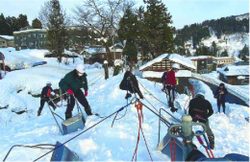
Prevent Accidents When Removing Snow from Roofs; Always Use Proper Gear and Follow Safety Precautions
JN ACCESS RANKING
-

Japan PM Takaichi’s Cabinet Resigns en Masse
-

Japan Institute to Use Domestic Commercial Optical Lattice Clock to Set Japan Standard Time
-

Israeli Ambassador to Japan Speaks about Japan’s Role in the Reconstruction of Gaza
-

Man Infected with Measles Reportedly Dined at Restaurant in Tokyo Station
-

Videos Plagiarized, Reposted with False Subtitles Claiming ‘Ryukyu Belongs to China’; Anti-China False Information Also Posted in Japan






















